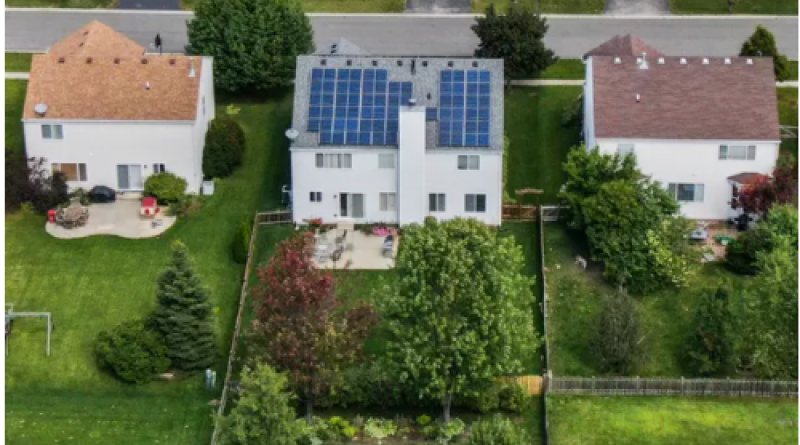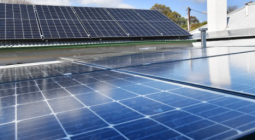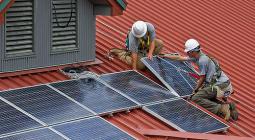Solar pushback: how US power firms try to make people pay for going green

In states like Kansas, energy companies want to impose charges on people who produce their own power with rooftop arrays.
Kevin Good is the president of a small solar power company in Kansas – a state that tends to be so sunny you’d think he’d have it made.
“I got into solar at maybe the worst point to do so in the last 50 years,” said Good, who runs Good Energy Solutions in Lawrence, a town of about 100,000.
Kansas has about as much solar potential as Florida but lags far behind the state, powering only about 12,000 homes – or less than 2% of what is covered in Florida, according to the Solar Energy Industries Association.
That could be related to an ongoing debate in the states that is pitting utilities companies against solar energy.
The Kansas utility Evergy has vastly expanded wind power in the state, but it is advocating for policies that would make customers less likely to install rooftop solar panels. That’s because if customers generate their own power, they won’t need to buy as much from Evergy.
The fight has played out in state after state, from Arizona to California to Massachusetts – as power companies are threatened by the transition.
In 2018, Evergy got permission from state regulators to collect fees from rooftop solar users, but Kansas’s highest court recently ruled that illegal. So, Evergy went back to regulators and asked them to approve different charges – a grid access charge and a minimum monthly bill. The regulators, at the Kansas Corporation Commission, rejected both proposals. They have told the company to work with solar advocates on a more holistic compromise.
Andrew French, the chair of the commission, said in February that his state isn’t the only one in a standoff surrounding solar, particularly about how to rework a policy called net metering – where customers are compensated for power they send back to the grid.
“This is not an issue unique to Kansas,” French said. “Others have implemented net metering 2.0 and beyond. I hope we will look at new models to try to figure out the appropriate way to value these resources.”
Rick Gillam, a program director with the national solar advocacy group Vote Solar, said that Evergy is like most utilities in opposing customers reducing their usage of utility-supplied electricity. “Its general animosity has created uncertainty for solar developers and customers alike,” he said.
Utilities have for years battled against net metering. Now, they are also turning to other billing strategies to try to recoup the money they fear they will lose when their customers aren’t as reliant on them.
States around the country are reconsidering how they compensate customers who have their own rooftop solar. A lawyer for the trade group for investor-owned utilities, Emily Fisher of the Edison Electric Institute, said at a regulatory conference earlier this year that utilities in 2020 installed 12 gigawatts of solar power and in 2021 are on track for even more.
But the pandemic left many customers unable to pay their bills, shifting costs on to others, she said.
“We have to be really mindful of costs as we continue to drive toward clean,” Fisher said.
**
Power companies have worried about a future like they see in California, which is far ahead of other states on rooftop solar and is considering overhauling electricity rules to try to boost adoption further. Environmental advocates say that amid the green energy revolution that the Biden administration is touting and climate scientists are calling for, utilities are standing in the way.
“It’s the wave of the future. Customer tastes are becoming green, they are becoming organic in what they eat and what they wear,” said Ahmad Faruqui, an industry expert with the consulting firm The Brattle Group. “Why should electricity be any different?”
The debate in Kansas specifically is not about whether climate change is happening and renewable power is necessary – but about how to shift the landscape to accommodate green energy despite pushback from powerful corporations.
Climate change deniers are increasingly out of place in the state, which has seen a significant economic boost from wind power. Kansas’s governor, Laura Kelly, is a Democrat, although the state legislature is controlled by Republicans. Kelly supports renewable power, especially wind.
One relatively new state senator, Mike Thompson, has attempted to propose anti-wind power legislation that one Kansas non-profit group has deemed among the “most restrictive”, in the US.
Thompson – a former meteorologist who has received campaign donations from both the fossil-fuel invested Koch brothers and a Pac for Evergy – denies the science that shows humans are heating the planet at an unsustainable rate. In a sign of the times, his fellow Republicans shot down his proposal, and it is unlikely to move forward.
Thompson and Evergy represent two sides of the opposition that stands to curb renewable power growth around the country.
Thompson’s complaints are ideological. He falsely argues the public “has been subjected to a constant barrage of falsified, exaggerated and alarming claims”, about climate change. He and other conservatives around the country have sought to cast renewables as unreliable and expensive.
Evergy, on the other hand, says it’s committed to reducing its climate pollution and has massively grown its wind power, displacing some coal-fired energy. Evergy’s power mix is 39% coal, 27% wind, 26% fossil gas, 7% nuclear and 1% solar and other renewable power.
Evergy’s senior vice-president, Chuck Caisley, said environmental advocates are unfairly painting the company as anti-renewables and that he just wants rooftop solar generators to help pay for the grid they use. Utility companies argue that when customers opt out, they will be forced to charge the remaining pool of users more.
“From an issue of fundamental fairness, we just don’t believe that because you put a solar array on your house, [your neighbor should] have to pay more,” he said. “It was never our intention to try and hurt the solar industry.”
But utilities remain monopolies, meaning their customers typically don’t have other options. They are typically regulated by elected or appointed state officials, who determine how big of a profit they can make from running plants and power lines.
Dorothy Barnett, executive director of the Kansas-based Climate + Energy Project, said those profit motivations have stalled progress for years.
“We could have worked together to find common ground and could have been so far ahead on solar,” Barnett said. “There were so many opportunities along the way that were missed because Kansas utilities were slow to recognize we are in a period of transition with our electric system.”
May 2021
The Guardian




